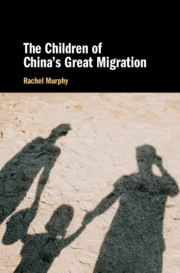Refine search
Actions for selected content:
4 results
6 - Spinoza’s Metaphysical Psychology
-
-
- Book:
- The Cambridge Companion to Spinoza
- Published online:
- 14 October 2021
- Print publication:
- 28 October 2021, pp 234-281
-
- Chapter
- Export citation
Chapter 4 - Volition and Its Dependence on Judgment
- from Part II - Choice Hylomorphism
-
- Book:
- Thomas Aquinas on the Metaphysics of the Human Act
- Published online:
- 25 June 2021
- Print publication:
- 08 July 2021, pp 74-99
-
- Chapter
- Export citation
1 - Understanding the Lives of Left-Behind Children in Rural China
-
- Book:
- The Children of China's Great Migration
- Published online:
- 06 August 2020
- Print publication:
- 20 August 2020, pp 1-38
-
- Chapter
- Export citation

The Children of China's Great Migration
-
- Published online:
- 06 August 2020
- Print publication:
- 20 August 2020
